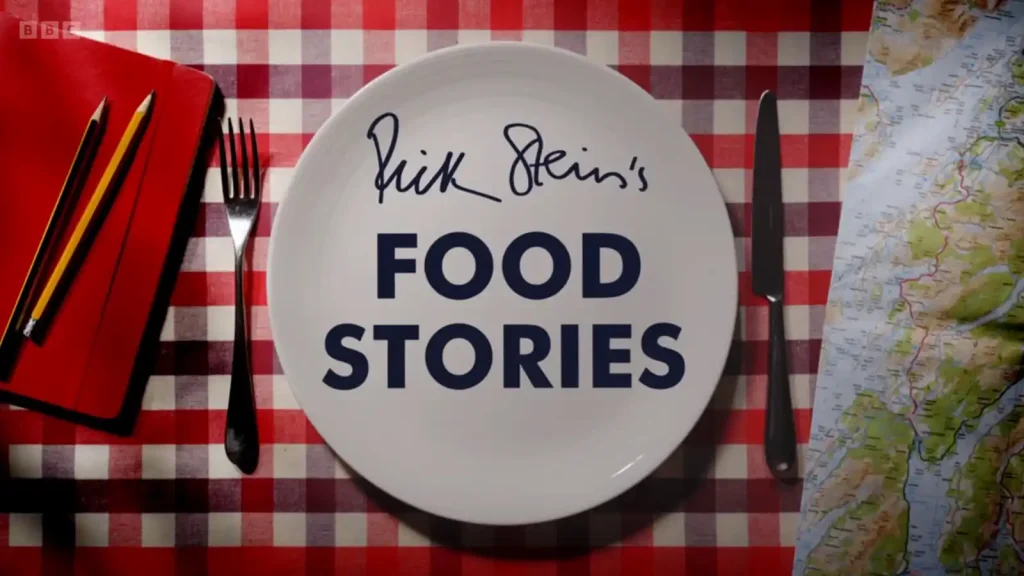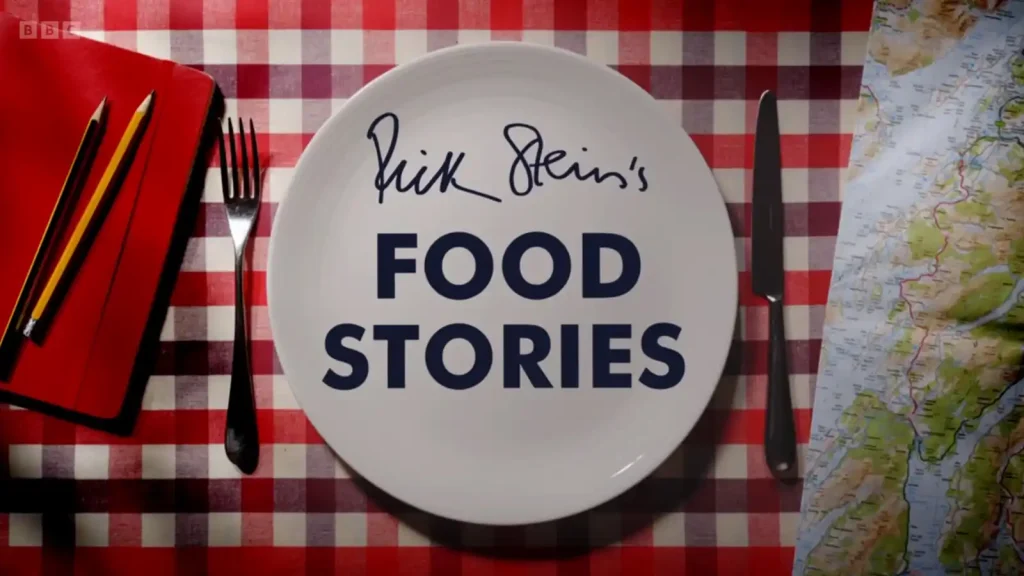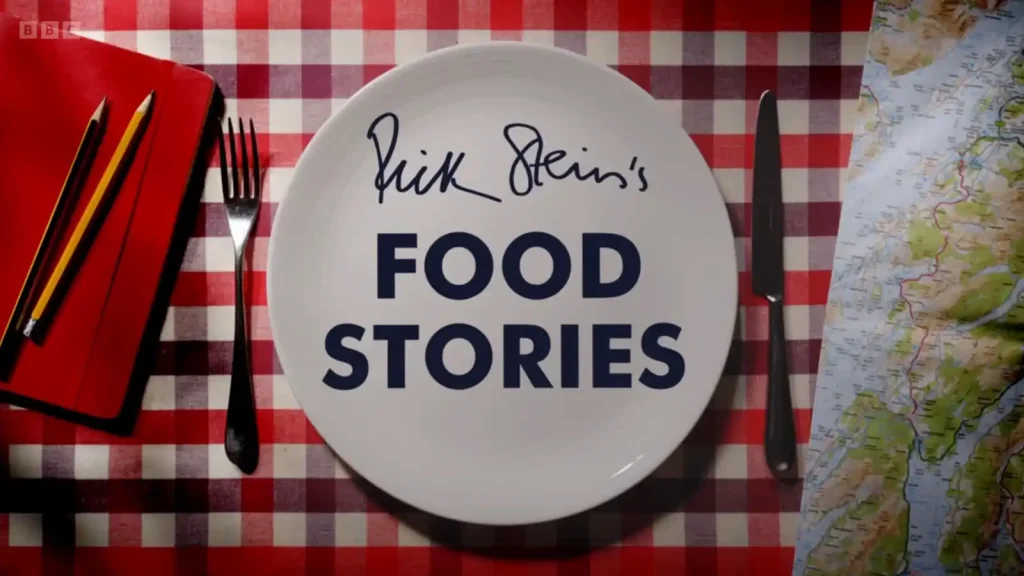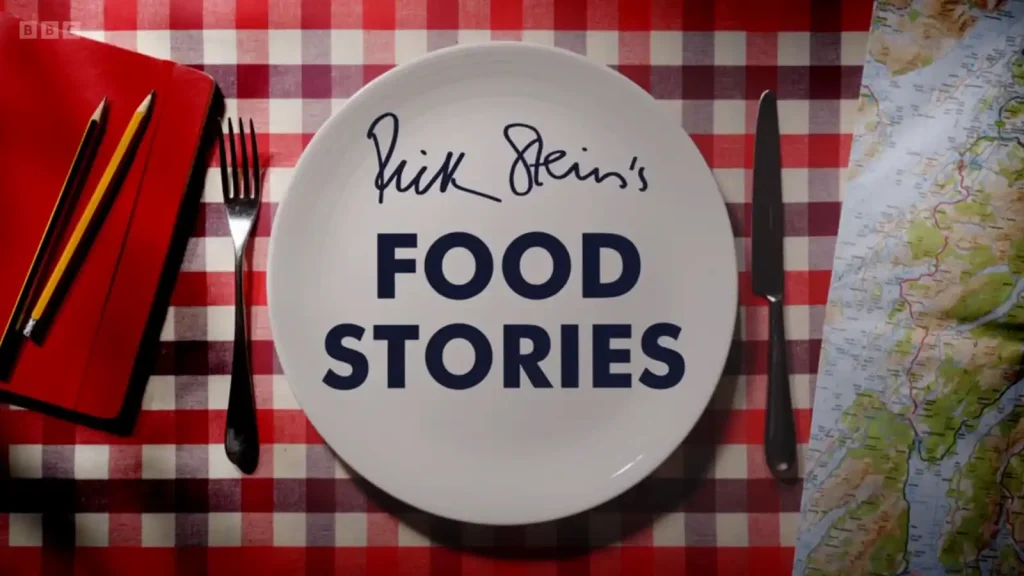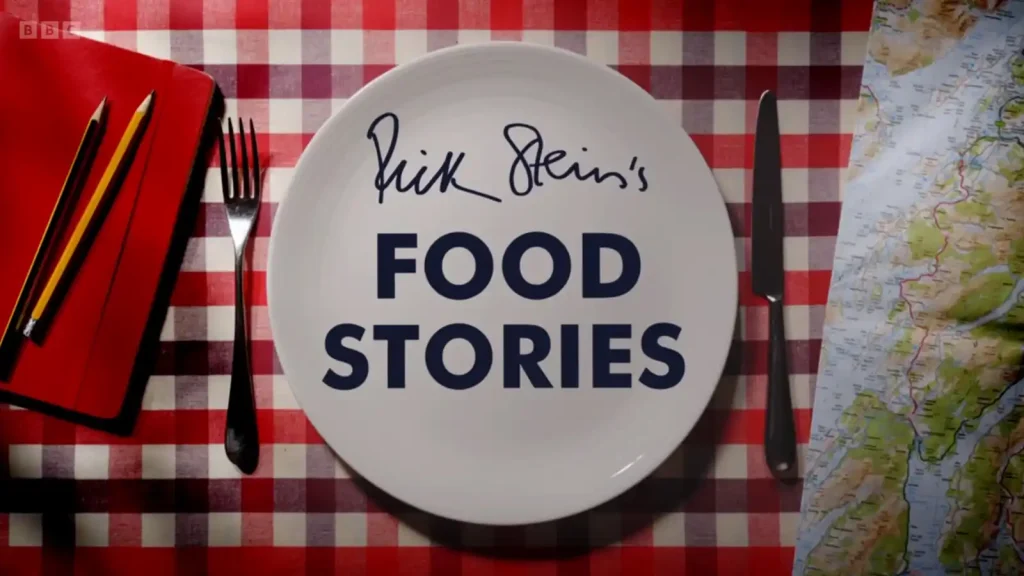Rick Stein’s Food Stories episode 8 – Suffolk: Halfway through his exploration of Britain’s culinary landscape, Rick Stein embarks on a journey through Suffolk, delving into the rich tapestry of flavors and traditions that define the region. His first stop is a charming local bakery, renowned for its handcrafted sourdough bread. Here, the ancient art of bread-making is alive and well, with bakers carefully nurturing each loaf to perfection, allowing the natural fermentation process to enhance the flavor and texture. The aroma of freshly baked bread fills the air, a testament to the dedication and skill that goes into every batch.
As Rick strolls through the quaint streets of Suffolk, he reconnects with an old friend, a fishmonger who has spent decades selling the freshest catch of the day right on the beach. This personal connection adds a warm, nostalgic touch to the episode, as the two reminisce about their shared love of the sea and the simple pleasure of enjoying seafood that’s as fresh as it gets. The fishmonger’s stall, with its gleaming array of fish and shellfish, is a reminder of the timeless relationship between the people of Suffolk and the bounties of the sea.
In the picturesque coastal town of Southwold, Rick uncovers a fascinating historical tidbit: the celebrated writer George Orwell, best known for his incisive social commentary, also had strong opinions about English cuisine. Contrary to what one might expect, Orwell was a staunch defender of traditional English cooking, which he believed was unfairly maligned. Rick delves into Orwell’s views, exploring how they reflect the cultural and social context of the time. This segment offers viewers not just a taste of Suffolk’s food but also a deeper understanding of the intellectual and cultural currents that have shaped the region’s culinary heritage.
Returning home, inspired by his travels and the stories he’s uncovered, Rick decides to experiment in his own kitchen. In a surprising twist, he tries his hand at making sushi, but with a uniquely British twist: pairing it with a hearty cabbage soup. This fusion of Japanese technique and English ingredients is a playful nod to the blending of culinary traditions that Rick so often celebrates. The process is both a learning experience and a testament to Rick’s belief that food is a universal language, capable of bringing people together across cultures and continents.
“Rick Stein’s Food Stories” episode 8 is a rich tapestry of food, history, and personal connections. From the artisanal craftsmanship of Suffolk’s bakers to the fresh seafood sold right on the beach, and from George Orwell’s unexpected culinary musings to Rick’s own kitchen experiments, this episode is a celebration of the diversity and depth of Britain’s food culture.
Rick Stein’s Food Stories episode 8 – Suffolk
Suffolk: The UK’s Breadbasket and Coastal Gem
Introducing Suffolk’s Dual Identity
Nestled in the heart of East Anglia, Suffolk stands as a testament to the diverse beauty of the British countryside. This enchanting county offers visitors a unique tapestry of experiences, weaving together two distinct yet equally captivating landscapes. On one hand, Suffolk boasts a sprawling agricultural heartland that has earned it the moniker of the UK’s breadbasket. On the other, it presents a stunning coastline dotted with charming seaside towns that have long been a magnet for holidaymakers and nature enthusiasts alike.
As you traverse Suffolk’s rolling hills and fertile plains, you’ll find yourself immersed in a world where golden wheat fields stretch as far as the eye can see. This agricultural powerhouse plays a crucial role in feeding the nation, with its bountiful harvests contributing significantly to the UK’s food security. Yet, just a short drive away, the landscape transforms dramatically, giving way to miles of pristine beaches, picturesque fishing villages, and rugged coastal cliffs that tell tales of centuries gone by.
The Agricultural Powerhouse
Suffolk’s reputation as the UK’s breadbasket is not merely a quaint nickname but a well-earned title rooted in its agricultural prowess. The county’s unique combination of fertile soils, favorable climate, and generations of farming expertise has created an ideal environment for wheat cultivation. In fact, Suffolk, along with its East Anglian neighbors, produces enough wheat annually to bake an astounding 5.5 billion loaves of bread. That’s enough to keep the entire nation in toast and sandwiches for months!
But Suffolk’s agricultural significance goes beyond mere numbers. The county’s farmers are at the forefront of sustainable farming practices, balancing productivity with environmental stewardship. From innovative crop rotation techniques to the adoption of precision agriculture technologies, Suffolk’s farming community is paving the way for a more sustainable future in food production. Moreover, this agricultural heritage has given rise to a thriving local food scene, with farm shops and farmers’ markets offering visitors a taste of Suffolk’s finest produce straight from the source.
Coastal Attractions
As if Suffolk’s agricultural riches weren’t enough, the county’s coastline is a treasure trove of natural beauty and historical significance. Stretching along the North Sea, Suffolk’s coast is punctuated by a string of charming towns and villages, each with its own unique character and allure. From the bustling port of Lowestoft in the north to the quaint charm of Felixstowe in the south, there’s no shortage of coastal gems to explore.
Perhaps the crown jewel of Suffolk’s seaside offerings is the picturesque town of Southwold. With its iconic lighthouse standing sentinel over the town, Southwold epitomizes the quintessential British seaside experience. Visitors can stroll along the town’s famous pier, indulge in freshly caught seafood, or simply relax on the pristine beach. For those seeking a more secluded coastal experience, the Suffolk Coast and Heaths Area of Outstanding Natural Beauty offers miles of unspoiled beaches, ancient heathlands, and tranquil estuaries teeming with wildlife.
The Sourdough Revolution: Artisanal Bread-Making in Suffolk
The Rise of Artisanal Bread
Imagine a world where the aroma of freshly baked bread wafts through every neighborhood, enticing passersby with its irresistible allure. This isn’t a scene from a bygone era, but rather a modern-day reality in Suffolk, where the artisanal bread movement has taken root and flourished. In recent years, there has been a remarkable shift in consumer preferences, with more and more people seeking out healthier, naturally made bread options.
This surge in interest isn’t just a passing fad. It’s a full-blown revolution, driven by a desire for authenticity, flavor, and nutritional value. As a result, artisanal bakeries have sprouted up across Suffolk like wild yeast in a sourdough starter. These small-scale operations are breathing new life into the age-old art of bread-making, much to the delight of local food enthusiasts and health-conscious consumers alike.
Acre Farm: A Micro-Bakery Success Story
At the heart of Suffolk’s sourdough revolution lies Acre Farm, a shining example of how passion and tradition can blend seamlessly with modern entrepreneurship. This micro-bakery, run by the dynamic husband-and-wife duo Alexander and Emily, has quickly become a local institution. Their commitment to traditional baking methods has struck a chord with customers who crave authenticity in an increasingly mass-produced world.
What sets Acre Farm apart is their unwavering dedication to the art of bread-making. At the center of their operation is a magnificent wood-fired oven, a behemoth of brick and mortar that seems to have a personality of its own. This isn’t just any oven; it’s a time machine that transports both bakers and customers back to an era when bread was more than just a staple – it was a work of art.
The Art of Sourdough
At the heart of every great sourdough loaf lies the starter – a living, breathing culture that gives the bread its distinctive tangy flavor and chewy texture. Creating and maintaining a sourdough starter is both a science and an art, requiring patience, attention to detail, and a touch of intuition. It’s a process that Alexander and Emily have mastered, treating their starter (affectionately named “Barry”) like a cherished family member.
The bread-making process at Acre Farm is a carefully choreographed dance that begins long before the first loaf hits the oven. It starts with the precise mixing of flour, water, and the all-important starter. Then comes the waiting game – a slow fermentation process that can last up to 24 hours. During this time, the dough develops its complex flavors and textures, transforming from a simple mixture into something truly extraordinary.
Tasting Tradition
When you bite into a slice of Acre Farm’s sourdough, you’re not just tasting bread – you’re experiencing a piece of Suffolk’s culinary heritage. The crust crackles satisfyingly as you break into it, revealing a soft, airy interior dotted with irregular holes – the hallmark of a perfectly fermented loaf. The flavor is complex and deeply satisfying, with notes of nuttiness and a subtle tang that lingers on the palate.
It’s no wonder that customers flock to Acre Farm, often lining up before dawn to secure their share of the day’s bake. For many, these loaves represent more than just food; they’re a connection to a simpler time, a taste of tradition in an increasingly fast-paced world. As one regular customer put it, “Eating this bread is like wrapping yourself in a warm, comforting blanket of flavor.” Indeed, with each bite, you can almost hear the crackling of the wood-fired oven and smell the earthy aroma of rising dough.
Preserving Coastal Traditions: Fishing in Aldeburgh
Dean Fryer: Last of the Aldeburgh Fishermen
As the sun peeks over the horizon, casting a golden glow across the Suffolk coastline, Dean Fryer is already hard at work. For over four decades, this weathered fisherman has been a fixture on Aldeburgh’s beaches, his silhouette a familiar sight against the backdrop of the North Sea. Dean’s story is not just one of personal dedication; it’s a living testament to a vanishing way of life.
In a world of industrial fishing fleets and global seafood markets, Dean stands as a proud guardian of local fishing traditions. His daily routine, unchanged for years, begins long before most of us have stirred from our slumber. With calloused hands and a keen eye, he navigates the temperamental waters, seeking out the day’s catch with the intuition that only comes from a lifetime at sea. Yet, as the sole regular fisherman left in Aldeburgh, Dean’s persistence raises a poignant question: What does the future hold for this centuries-old profession?
The Changing Face of Coastal Fishing
The tides of change have not been kind to traditional fishing communities like Aldeburgh. Global warming, once a distant concern, has now become a tangible threat to local marine ecosystems. Dean has witnessed firsthand the gradual disappearance of cod from these waters, a fish that was once a staple of the local catch. The warming seas have driven these cold-water denizens northward, fundamentally altering the composition of Dean’s daily haul.
Moreover, the regulatory landscape has become increasingly complex, creating a labyrinth of challenges for small-scale fishermen. Gone are the days when one could simply buy a boat and set out to sea. Today, aspiring fishermen must navigate a sea of paperwork, from fishing licenses to safety certifications. These bureaucratic hurdles, while designed to protect marine resources and ensure safety, have inadvertently raised the barriers to entry for newcomers to the profession. Consequently, the number of young people willing to take up the mantle of coastal fishing has dwindled, leaving veterans like Dean as the last custodians of this maritime heritage.
From Sea to Table: Local Seafood Economy
Despite the challenges, there’s a silver lining to Dean’s story – a growing appreciation for locally sourced, sustainably caught seafood. As Dean’s boat pulls up to the shore each morning, a small crowd invariably gathers, eager to purchase the freshest fish Aldeburgh has to offer. This direct-to-consumer model not only ensures Dean receives fair compensation for his labor but also allows customers to connect with the source of their food in a meaningful way.
The local hospitality industry has also played a crucial role in sustaining Aldeburgh’s fishing tradition. Restaurants and hotels, recognizing the unique appeal of locally caught seafood, have forged strong relationships with fishermen like Dean. This symbiotic partnership has created a thriving micro-economy, where the catch of the day often travels mere meters from boat to plate. As a result, visitors to Aldeburgh can savor the authentic taste of the North Sea, prepared with the expertise of local chefs who understand the value of fresh, sustainable ingredients.
Embracing Culinary Trends: Sushi-Making with Local Catch
In an unexpected twist, the traditional catch of Aldeburgh’s fishermen has found a new audience through the rising popularity of sushi in the UK. This fusion of local ingredients with global culinary trends exemplifies the adaptability of coastal communities like Aldeburgh. Enterprising chefs and food enthusiasts have begun experimenting with Suffolk’s seafood, creating unique sushi rolls that showcase the best of both worlds.
Imagine biting into a maki roll filled with freshly caught Aldeburgh crab, or savoring a nigiri topped with locally sourced sea bass. These creations not only tantalize the taste buds but also tell a story of cultural exchange and culinary innovation. By embracing these new trends, Aldeburgh’s fishing community has found a way to remain relevant in a changing gastronomic landscape. This adaptation ensures that the fruits of Dean’s labor continue to be appreciated, albeit in forms he might never have imagined when he first set out to sea decades ago.
Valle d’Aosta cabbage soup
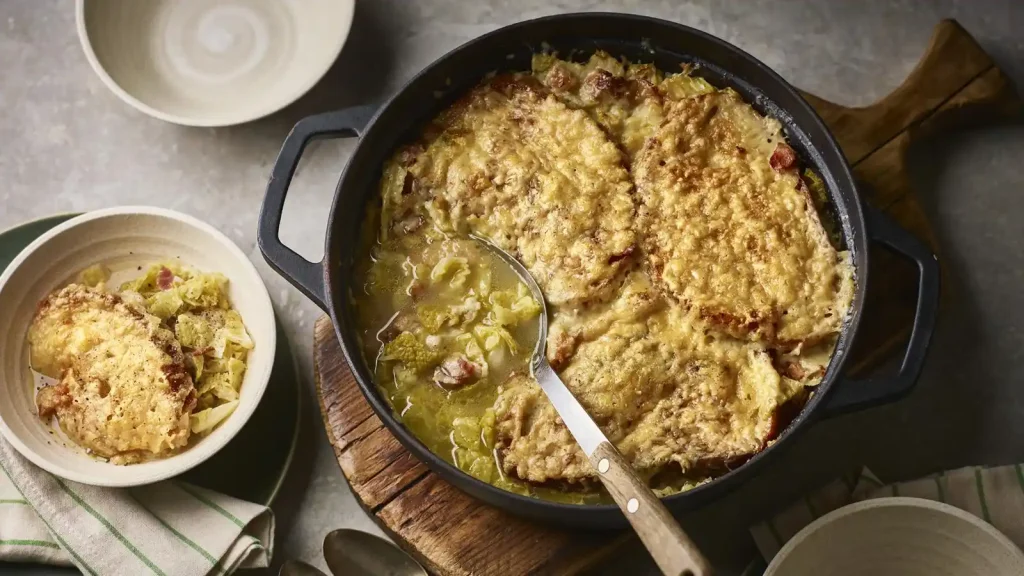
This hearty, soul-soothing dish hails from the rustic kitchens of the Italian mountains, offering a comforting blend of robust flavors in every bite. Imagine a bowl of chunky baked cabbage soup, where tender leaves of cabbage are complemented by the irresistible crunch of crispy bacon and the luxurious melt of velvety cheese. Each spoonful is a rich, indulgent experience that warms you from the inside out. Elevate this dish to gourmet status by using a homemade stock or opting for a high-quality store-bought variety, ensuring every flavor is deeply satisfying and delicious.
Ingredients:
- 300g/10½oz Gruyère, emmental or gouda, grated or thinly sliced
- 60g/2¼oz Parmesan, grated
- 1.5 litres/2¾ pints good-quality chicken, beef or vegetable stock
- 500g/1lb 2oz Savoy cabbage, chopped
- 70ml/2½fl oz olive oil
- 6 rashers streaky smoked bacon, chopped
- 30g/1oz butter
- 1 large garlic clove, cut in half
- 5–6 thick slices (about 250–280g/9oz–10oz) stale, dry sourdough bread
- salt and freshly ground black pepper
Method:
- Place over a medium heat and bring to a simmer, then put the dish in the oven and bake, uncovered, for 30–40 minutes until hot, bubbling and all the cheese has melted. Serve in warm bowls.
- Mix the cheeses together in a bowl.
- In a large saucepan, bring the stock to the boil, add the cabbage and cook for 5 minutes, then turn off the heat and set aside.
- Heat a little oil to a large frying pan over high heat and fry the bacon pieces until golden-brown and starting to crisp. Remove them from the pan and set aside.
- In the same pan, add the butter, a little more oil and the garlic. Once hot, fry the pieces of bread until golden-brown and crisp on all sides. Do this in batches, setting each batch aside once browned and adding more oil as needed.
- Preheat the oven to 200C/180C Fan/Gas 6.
- In a large flameproof casserole, use a slotted spoon to put half the cabbage in the bottom of the dish and season with plenty of pepper and a little salt. Add half the bread, half the bacon and half the cheese mixture.
- Add the remaining cabbage, then bread and bacon. Ladle over the hot stock and top with the remaining cheese.
F.A.Q. Rick Stein’s Food Stories episode 8 – Suffolk
Q.: What is the focus of Rick Stein’s Food Stories Episode 8 in Suffolk?
A.: Rick Stein’s Food Stories Episode 8 focuses on exploring the culinary traditions and flavors of Suffolk. The episode highlights the artisanal bread-making techniques in a local bakery, the rich fishing culture along the Suffolk coast, and the unique insights into English cooking by George Orwell.
Q.: What makes Suffolk an important location for this episode of Rick Stein’s Food Stories?
A.: Suffolk is significant in this episode due to its dual identity as both a major agricultural region, often referred to as the UK’s breadbasket, and a coastal area with a rich fishing tradition. These aspects are central to the culinary experiences showcased by Rick Stein in the episode.
Q.: How does Rick Stein incorporate local ingredients and traditions in his cooking in this episode?
A.: In the episode, Rick Stein combines local Suffolk ingredients with global culinary techniques, such as using fresh local fish to create a British-inspired sushi dish. This reflects his approach of blending traditional and contemporary methods to highlight the region’s culinary diversity.
Q.: What historical or cultural elements are explored in this episode of Rick Stein’s Food Stories?
A.: The episode delves into the cultural history of Suffolk, including a discussion on George Orwell’s defense of traditional English cuisine. Rick Stein also explores the longstanding traditions of bread-making and fishing that have shaped the region’s food culture.
Q.: What is unique about the bread-making process in Suffolk as shown in the episode?
A.: The episode highlights the artisanal bread-making process in Suffolk, where bakers use traditional fermentation techniques to create sourdough bread. This method emphasizes the natural development of flavor and texture, showcasing the dedication and skill involved in preserving this age-old craft.
